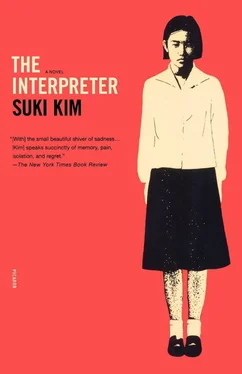Suki Kim - The Interpreter
Здесь есть возможность читать онлайн «Suki Kim - The Interpreter» весь текст электронной книги совершенно бесплатно (целиком полную версию без сокращений). В некоторых случаях можно слушать аудио, скачать через торрент в формате fb2 и присутствует краткое содержание. Город: New York, Год выпуска: 2011, ISBN: 2011, Издательство: Picador, Жанр: Детектив, Триллер, на английском языке. Описание произведения, (предисловие) а так же отзывы посетителей доступны на портале библиотеки ЛибКат.
- Название:The Interpreter
- Автор:
- Издательство:Picador
- Жанр:
- Год:2011
- Город:New York
- ISBN:0-312-42224-5
- Рейтинг книги:3 / 5. Голосов: 1
-
Избранное:Добавить в избранное
- Отзывы:
-
Ваша оценка:
- 60
- 1
- 2
- 3
- 4
- 5
The Interpreter: краткое содержание, описание и аннотация
Предлагаем к чтению аннотацию, описание, краткое содержание или предисловие (зависит от того, что написал сам автор книги «The Interpreter»). Если вы не нашли необходимую информацию о книге — напишите в комментариях, мы постараемся отыскать её.
The Interpreter — читать онлайн бесплатно полную книгу (весь текст) целиком
Ниже представлен текст книги, разбитый по страницам. Система сохранения места последней прочитанной страницы, позволяет с удобством читать онлайн бесплатно книгу «The Interpreter», без необходимости каждый раз заново искать на чём Вы остановились. Поставьте закладку, и сможете в любой момент перейти на страницу, на которой закончили чтение.
Интервал:
Закладка:
I wish I wasn’t your daughter.
She had meant it, and they knew it. There are words one cannot take back, intentions that are permanent.
It is useless going back to bathe now. The moment is gone, the shock of hot water running over her body has had its fill. She stands in her towel and lights a cigarette instead. She barely inhales before putting it out. The ashtray is filled with half-smoked cigarettes. Lately, cigarettes have begun to taste bitter. She has heard that it happens when one stops longing. Each time one of those righteous ladies comes up to her on the street and clicks her tongue with the cigarettes-are-so-bad-for-you speech, she wants to spit back something equally rude, like “So is your corduroy dress for your sex life.” But instead, she throws them the coldest stare, which usually wipes the benevolent smile right off their faces. Damian used to tease her for it. He used to say that Philip Morris should give her a medal for being one of the last true militants. He himself never touched them. He said that cigarettes were for the young, and it would be embarrassing for him at forty-nine to be sucking on something so obviously seductive. But he liked watching her smoke. “Take off your bra.” He would surprise her with an order so abrupt, and she would hold on to the cigarette between her lips while unhooking the strap with both her hands. “Take off your stockings,” he’d say. And before the end of the cigarette, she would be ready, and Damian would finally reach over and take the cigarette from her lips and stub it out.
Still she refuses to quit, although she can no longer smoke a whole cigarette. Still it is the one thing she recognizes in herself. It’s like a line from a Leonard Cohen song, a girl who’s been left with nothing but a pack of cigarettes. Nothing is familiar any longer, nothing sinks. Since Caleb left, the apartment became bare. Hardly any furniture except for a futon and a mahogany dining table with two chairs. No posters lighten up the walls, no pretty fabrics cover the cracks in the corner. The only obvious electronic items are the Sony boom box and a fourteen-inch television set. The table and the TV belong to Caleb. “Turns out that a married life needs something more than Ikea,” he sighed when she asked him if he wanted his stuff back.
During her first year back in New York, Suzy watched TV all day. It was a new thing for her. Her parents never had time to sit around, because they were always working, and when they did watch, for an hour or two on rare weekends, they would put on Channel 47, which was the East Coast’s only Korean programming, whose jokes were lost on her. Grace had no tolerance for it either. It bored the hell out of her, she said, turning back to the book in her hands; the only thing she did with any enthusiasm was read. And when Suzy lived with Damian, of course there was no TV. Despicable, he grunted. American culture is the gutter, worse than drugs, definitely worse than cigarettes! Damian would have turned away in disgust if he saw how Suzy started the day now with Good Morning America and continued with Regis and Kathy Lee until midday, when the wildly convoluted sagas of daytime soaps unfolded. They had fabulous titles like All My Children and Days of Our Lives. There was one called The Bold and the Beautiful , which she thought was a more appropriate name for a body shampoo or a cologne. She welcomed the whole ritual, to lean back in her futon with a bowl of microwaved popcorn and lose herself in the entangled lives of Yasmina or Desiree or Katharina, who all seemed to have popped out of the Ms. Clairol box, and the occasional black or Asian ones, who looked even more Ms. Clairol—like with their perfectly coifed hair, which, even though they were definitely not blonde, still carried the just-walked-out-of-a-salon essence as they bobbed along with the saccharine smile of the golden girl’s best friend. Her favorite was One Life to Live . She tried not to miss it, only because she found out while watching Regis and Kathy Lee one morning that it was the least popular among the soaps. She thought this was unfair, since they were basically interchangeable. In fact, even the actors seemed to skip around. She was sure that she had seen one particular actor in the two o‘clock soap as a handsome but evil doctor, and then, a week later, she would find him at three o’clock on another channel as a self-made millionaire. Then, of course, she would quickly discover that he had been killed in a plane crash in one soap but smoothly popped into another with a newer and nicer character. She envied their resurrecting lives. They never died, not completely. There seemed to be always a way out, a second, even a third chance. People did not just disappear without proper explanation. Tragedies came with namable causes and retribution. Their fate was a puzzle but an easy one, and days, months would fly by as she watched and toyed with the missing bits.
She stopped watching TV when she got her first job. Or maybe she got the job in order to stop watching it. No matter how frequently and closely she watched, she was never sure what really went on, who had supposedly died only to return with amnesia, who was cheating on whom with whose husbands and wives, who was kidnapped on the day of the wedding by the priest who turned out to be a spy. She thought these dramas required specific minds that could keep up with all the details. Yet what made her finally turn the TV off had nothing to do with its mind-numbing spell, but the gunshot. At least one or two characters were killed on TV each day. Almost always in daytime soaps, the victims came back alive, and the actual shooting scene was skipped over. But there were the odd ones that would show the entire gruesome sequence in detail—the index finger on the trigger, the horrified victim shuddering, the squinting of the killer’s vengeful eyes, the slow falling of the body as the final ray of blood spurts out. The first time she saw a scene like that, Suzy was fixated. She could not stop thinking about it and wanted to record it to watch again and again. But the second time it happened, she felt sick and lay still on the futon and did not move for hours. And the third time, she shut it off and moved the TV set to the farthest corner of the apartment. She never went near it again.
“You’re waiting for a whistle to blow; it’d take you less than five minutes to grab your stuff and run,” said Jen when she stopped by a few months ago, which she rarely did. “Deadline,” she claimed. “Drop by the office, we’ll go to the Royalton for lunch on the company’s account.” But Suzy knew that Jen did not want to meet at home. When lounging at each other’s apartments, they naturally fell into the familiar ways of former roommates. One would get up to pour coffee before the other even asked for a refill, or bring the ashtray before the other took out a cigarette. Yet somehow, sitting on the futon with the coffee brewing, they could not help remembering the way Suzy had quit and left an irreparable hole in their college days. Jen was right, though. The apartment resembles a temporary shelter. There is no sweetness here, no flowery sheets, no matching duvet cover, no framed childhood photos. In fact, Suzy cannot say if she is attached to anything anymore. A jade ring that once belonged to her mother? An album filled with her childhood photos? A videotape of her seventh-birthday party? No such memorabilia in her apartment. Sure, Grace might have retrieved a few items from the Queens house where their parents had lived in their final years—their family having moved frequently through their growing up—but how important were such things if she had rarely missed them all these years? In college, Suzy envied Jen, who went home every few months to her parents’ Connecticut mansion, where her childhood bedroom was intact with her Barbie and her tattered Cure poster and a bulletin board filled with the snapshots from her high-school excursion to St. Petersburg. The shrine of such a lovely American past, to Suzy, suggested an emblem, a reference to what Jen would become, what Jen could only become—a successful editor, the one-bedroom apartment on Central Park West, a summer share in the Hamptons, a boyfriend of her own age in his final year of residency at Johns Hopkins. They were all the right, correct things in life, which a smart, ambitious young woman such as Jen, upon finishing an Ivy League education, was expected to find in such a scintillatingly possible ground as New York City.
Читать дальшеИнтервал:
Закладка:
Похожие книги на «The Interpreter»
Представляем Вашему вниманию похожие книги на «The Interpreter» списком для выбора. Мы отобрали схожую по названию и смыслу литературу в надежде предоставить читателям больше вариантов отыскать новые, интересные, ещё непрочитанные произведения.
Обсуждение, отзывы о книге «The Interpreter» и просто собственные мнения читателей. Оставьте ваши комментарии, напишите, что Вы думаете о произведении, его смысле или главных героях. Укажите что конкретно понравилось, а что нет, и почему Вы так считаете.












